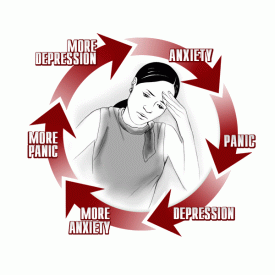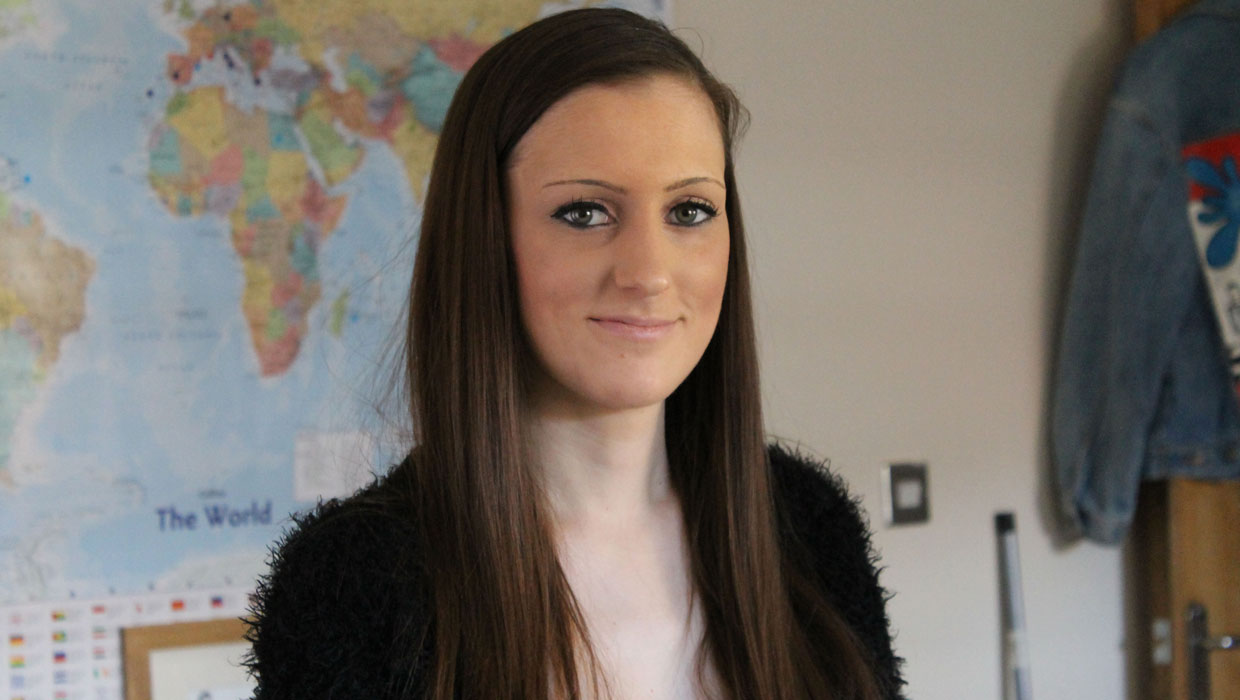
“The last time I went to the doctors about my anxiety, I was told I was beginning to show the symptoms of Agoraphobia. I had become nervous about leaving the house, to the point that I would avoid it as much as possible, unless I had someone with me.”
21-year-old student Jane Boyd* has been suffering from anxiety and forms of depression since the age of 15. For many people waking up in the morning, going to work, town or completing daily activities, these are normally not a chore. However, for some, daily activities can turn into a fight against reoccurring mental issues and can eventually become too hard to complete.
The Mental Health Foundation has noted that the rate of anxiety disorders rose to 15% of the population in 2007. This is equivalent to one in seven of the population, or 7.1 million people, suffering from some form of anxiety disorder. At least 50% of this number will be women suffering from educational, work or home-related stress. Dr Tom Wilsher, a doctor for 15 years, noted, “mental health issues took up 40% of all GP consultations.” But what triggers these feelings, what is anxiety and how can it affect you?
The main problems associated with anxiety disorders are agoraphobia (a fear of open places), panic disorder (a fear of having a panic attack itself) and of course anxiety itself (a sudden irrational fear bringing on panic.) Any of these can be disruptive to a person life and people suffering from these can become embarrassed to talk about them due to stigma attached to mental health issues.
Many people wrongly believe that mental health problems, like anxiety and depression, need some form of underlying health problem to help to trigger it. Surprisingly however, anxiety and depression can just about affect any person with or without any underlying problems. As Dr Wilsher states, “With some people, something bad happens and you can’t manage it and you become depressed. Some people don’t need to have something bad happen they just become depressed it’s something androgynous.”
Unfortunately as life becomes busier, the enhanced stresses of a recession are proving that problems with anxiety are becoming more wide spread. The consequences of people becoming more readily contactable due to mobile phones and social websites such as Facebook are that people are finding it harder to take time for themselves and unwind from the stresses of day-to-day life and therefore triggering feelings of anxiety and depression.
David Meller of Anxiety UK says: “The triggers of anxiety can come from virtually anywhere. For some a poor life style such as smoking, excessive drinking and lack of sleep combined with stress at home or work or in education can be contributing factors to triggering anxiety.
“For others it may be a significant lifestyle change such as moving from one house to another, losing a loved one, or the end of a relationship that can cause a person to start to worry about the future and then begin to show symptoms of anxiety.”
Even the smallest of changes can put into effect the onset of anxiety. As Meller states the changing of ones lifestyle can bring about a fear of a new start away from the usual comforts, friends or family, this can then help to lead to anxiety setting in. For others the breaking up of a relationship has been at the centre of their fight with anxiety and depression. For others the problems may have begun with a bigger change within their lives that has displaced their mindset.
Teona explains what she believes triggered her anxiety by continuing, “My anxiety began as a side affect to my anorexia. My doctor explained that they could both be the late effects of dealing with my parents divorce and then moving from Moscow to Reading.”
For many people the affects can be manifested in physical symptoms such as a shaking or trembling feeling, cold and hot flushes, shortness of breath, cold sweats and an increased heartbeat. These physically symptoms can start to make a person fearful of being out in public just in case they exhibit some of these features of anxiety and what may happen to them if this does happen.
These feelings can even lead on to problems such as agoraphobia, as seen in the case of Miss Parsons. Not all symptoms of anxiety are physically seen however, for some sufferers of anxiety and panic disorders the symptons are much more mental then physical.
Many sufferers have spoke of feeling disorientated, unable to concentrate and feeling that they are going crazy, or not in touch with in reality. This is known as a common feeling of Depersonalisation or Derealisation.
These two feelings are normally felt at the height of a panic attack and can cause the sufferer to be scared of having this feeling and thus causing another panic attack otherwise known as having ‘fear of the fear.’
“Some people manifest physical symptoms, like they lose their appetite, their shaky, their heart races or chest gets tight.” Dr Tom Wilsher explains. “These are really distressing symptoms. If you feel like you can’t breath, think your having a heart attack, sweating might even feeling like your going pass out. A panic attack type of thing. It’s a panic attack worrying about having a panic attack like a vicious cycle.

Some will believe that they are infact going mad, losing their minds, suffer a unreality or depersonalisation for example feelings of being spaced out or dream like and disconnected to life around them.”
As Dr Wilsher noted, without talking to someone about the problems faced by anxiety or panic disorders the patient could actually make themselves feel worst or even that they are the only one facing these problems and could therefore isolate themselves from other people that can help them diagnose and combat the problem.
Many people can build up these feelings and put a barrier in their mind that they are unable to breakthrough and allow it to slow down their everyday life even bring it to a complete halt, as they don’t know how to cope with these feelings. As writer Robert Albert Bloch said, “Anxiety is a thin stream of fear trickling through the mind. If encouraged it cuts a channel into which all other thoughts are drained.”
This can be considered true for many sufferers, the anxiety can bring on thoughts that they can not get rid of and leading on to more irrational thoughts eventually displacing the rational ones until panic sets in. For many sufferers this can leave them scared and confused at to what to do next in the fight against anxiety.
The affects of anxiety and depression are also elevated by excessive drug, or alcohol consumption, which many use to help cope with the range of problems, brought on by fear of anxiety. However, excessive use of these may curb the effects for a short while but unfortunately dependence on these substances can occur and then make the feelings of anxiousness much worst then before.
Sarah Richards, 23, of Southampton, developed problems with anxiety after a serious car crash 3 years ago. She however hasn’t been to see the doctor about her disorder and has faced problems in her everyday life. She explains, “I have become more and more paranoid and claustrophobic. I’m to scared to talk to people about how I feel I think I have made myself worst.”
Sarah way of life has sadly been compromised by the onset of anxiety; her social life hasn’t been what it was and has even faced problems everyday about the feelings that she has. Unfortunately due to worries about her anxiety, this led to drug use and made the effects worst.
She continued saying, “ I have taken drugs and I do believe it has worsened my state of mind.” Some people unfortunately feel the same way as Sarah, and at this point these people should start looking at treatment to help them with their day-to-day lives before they develop a more serious case of anxiety.
The treatment that can be used in the fight against anxiety and depression however, is in high numbers, widely available and as simple as even reaching out and talking to someone about the problems that you face.
Talking to somebody, whether they are a doctor or even just a friend or a family member, can help to take the weight off someone suffering from anxiety problems. To finally speak to someone and realise that the problem is a common and treatable one is a step in the right direction for many sufferers.
Anxiety UK helps sufferers to come into contact with others with its user-led self-help groups and help-lines. “Talking to a person with understanding knowledge and experience can be a great help,” David says. For others there are more extensive ways of helping to solve the problems face with anxiety.
Many people are fearful of using medication to help to combat the effects of anxiety and depression but in some cases medication is not used and doctors are now known not to want to have patients using medication due to addiction. For that reason there are many other none meditational treatments used in the fight against anxiety.
There are treatments such as Cognitive Behavioural Therapy or CBT for short, or even hypnotherapy, which will allow the user to talk about the problems that they have and then gain the strength to face them. They will then be able to differentiate between irrational thought that’s anxiety and depression can create and the thoughts their rational thoughts.
CBT was developed and used in treatment, in the early 1950’s, by Albert Ellis who produced the first rational therapy theory. CBT is based around technique driven, self-help treatments. Keeping a diary, testing assumptions the patient has, facing their fears and trying out new ways to distract their minds when suffering from a panic attack and learning ways to relax during a panic attack. CBT has been known to help on a wide scale; in 2000 a report stated that 73% of people using CBT would have lost their symptoms within 6-12months.
Hypnotherapy, as a treatment, is applied to help to modify a person’s behaviour in the conditions of stress, personal development or anxiety. This can also be combined with CBT for better affects. In 2003 a study announced that of 444 studies used there was a 67% success rate in the treatment of anxiety.
However, for some people treatments such as these may not start to work until they feel they can readily control their anxiety. For some medication may be the only answer but this can help a person and the struggle they are facing each day and can be a step in the right direction.
“Medication was the only option for me as I was very ill due to my anorexia, but they helped me to control my anxiety and I then cam off them,” Teona explains “I have used hypnotherapy and it worked well for a month which was good but it is quite expensive. Though due to these treatments I now feel as if I have enough experience to cope on my own and without medication.”
Anxiety can make a person feel like they are on their own, and therefore can only face this problem with only themselves for help. As you read earlier many people see anxiety as an embarrassing problem or even something that will only happen to people with underlying mental health problems, this can cause others to not talk about their fears over the subject.
Thanks to programs run at charities such as Anxiety UK, who are fighting to tackle the stigma attached to mental health and anxiety throughout the media, more people are being treated for problems with their anxiety rather then suffering in silence.
For someone that suffers from any type of anxiety they should go to see their doctor or GP as soon as possible, as many people who endure the affects of anxiety and depression alone will ultimately suffer more. Even something as simple as finally opening up to a close personal friend can be the first step to recovery and remembering to not let a common problem defeat you.
As Teona says “Its just a frustration. It’s so common that I feel it shouldn’t be a problem. I know with time I will just forget about it. I refuse to let anxiety stand in my way.”
Related articles
- Anxiety disorders (bupa.com.au)
- Remedies To Remedy Anxiety And Panic and anxiety attacks (thediamondringreview.com)









